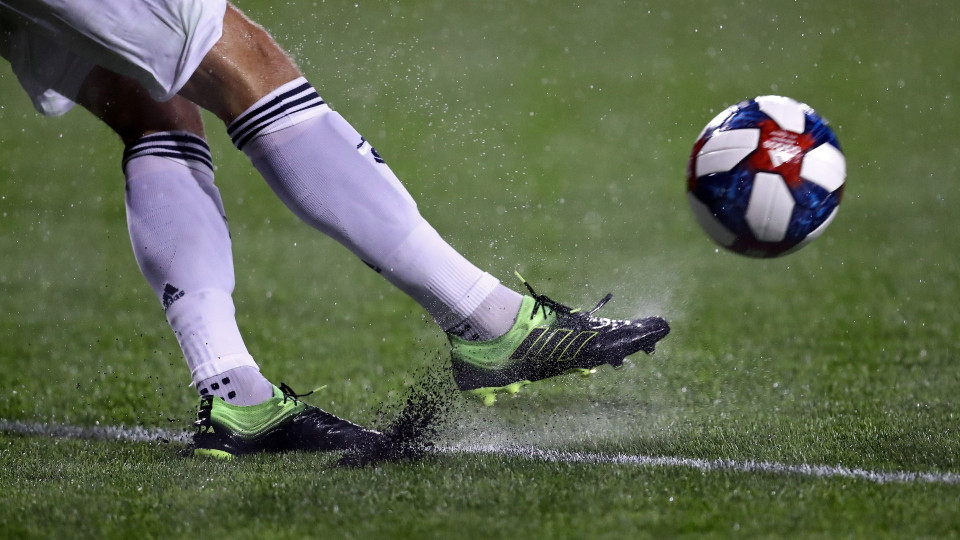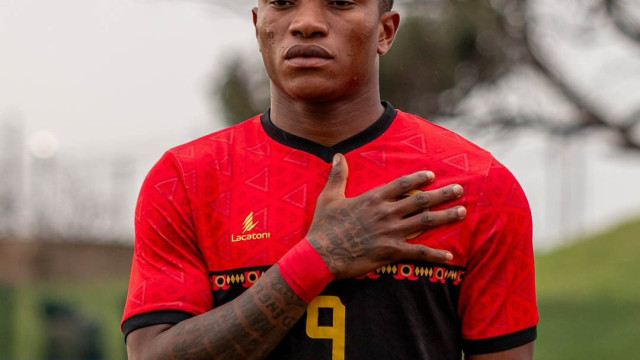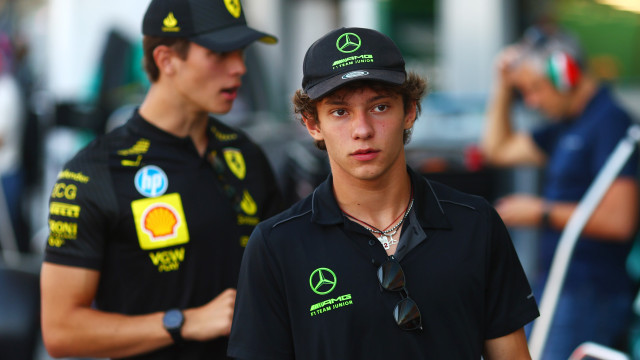April 25: Derbies interspersed sociopolitical shock in 70 days
The double Lisbon derby played between Benfica and Sporting in the spring of 1974 helped to reflect the transformation of Portuguese society implied by the 25th of April, starting from the gradual popularity of football as a mass phenomenon.

© Reuters
In 70 days, the two rivals faced each other twice, with the 'eagles' winning at the 'lions' home for the 26th round of the I League (5-3), on March 31st, in a triumph incapable of avoiding Sporting's 14th national champion title, whose fourth of six 'doubles' was sealed in the final of the Portuguese Cup (2-1, after extra time), on June 9th, at the National Stadium, in Oeiras.
The country's political scenario was transformed in that period, with the Carnation Revolution overthrowing the dictatorial regime then commanded by Marcello Caetano, who, curiously, had been cheered by more than 80 thousand people almost a month before, when accompanying José Veiga Simão, Minister of National Education, Mário Morais de Oliveira, Minister of State, and the leaders of each club in the grandstand of the old 'green and white' stadium.
"It's fantastic to see that the force of football made Marcello Caetano appear in a game to test what was or was not accepted by the Portuguese people. He was trying to do some different things, but the preparation for the military coup was already there", framed to the Lusa agency António Simões, former Benfica forward, between 1961 and 1975.
António de Oliveira Salazar's successor in the presidency of the Council tried to achieve some sense of security on a day of football fervor, after having taken refuge in Monsanto in the face of a failed military revolt from Caldas da Rainha, on March 16th, the eve of Sporting's triumph over FC Porto (2-0), on the 24th round.
"That had a certain emphasis in the news and we waited a few hours for the duel to take place. Our president João Rocha was quite interventionist and knew how to safeguard the situation", indicated to the Lusa agency Carlos Pereira, former defender of the 'lions', from 1972 to 1975.
Sporting won with a 'bis' by Dinis in Alvalade, where, two weeks later, two goals by Héctor Yazalde - winner of the Golden Boot in 1973/74, with a record of 46 goals in an edition of the I League - and one by Dé did not prevent a home defeat against Benfica, which retaliated by Humberto Coelho, Nené (twice), Jordão and Vítor Martins.
"We were living a moment of great euphoria, as we were having a fantastic season. Presence of Marcello Caetano? We were warming up when he entered and we noticed some sense of public demonstration, especially in the central stand. We considered this appearance normal, which was overshadowed by the importance of the duel. We were very focused on being national champions", acknowledged Carlos Pereira.
Benfica was two points behind Sporting, who would never let go of the top and was consecrated on the last round, by winning in Barreiro (3-0) 25 days after April 25th, whose eve had been marked by the 'leonine' defeat in Magdeburg (1-2), in the second leg of the 'semis' of the Cup Winners' Cup, and by a troubled return trip to Lisbon.
Present in the capital on the day of the revolution, António Simões lived a "special moment" and observed "another city, but with the same people" on their way to another 'eagles' training, who would meet their 'neighbor' from the 2nd Circular in the final of the Portuguese Cup, responsible for having prevented the 'incarnates' 'tetra', as in 1965/66 and 1969/70.
Chico Faria and Marinho reversed Nené's goal and sealed Sporting's ninth conquest in the 'queen' competition, which achieved the first 'double' in democracy, indifferent to the dismissal the day before of coach Mário Lino, replaced by assistant Osvaldo Silva.
Carlos Pereira does not forget a "unique and very symbolic" match, in which the national anthem was preceded by the musical password "Grândola, Vila Morena", by José Afonso, who, a month and a half before, had announced the beginning of military operations against the dictatorship.
The generalized feeling of joy in the streets was reflected in the National Stadium, where a crowd watched the final next to the pitch and invaded it peacefully at some moments, with António Simões reflecting that the people "were not prepared to enjoy total freedom of action" during the Ongoing Revolutionary Process (PREC).
"I wouldn't say that football served as a catalyst, but there are many people who find ways to express behaviors there that are contained in their social life. In a period of greater instability, in which political power is uncertain and uncertainty is greater within society, it is very likely that violence [in sports venues] was enhanced by the very state of affairs in which the country found itself in those two years of the PREC, between 1974 and 1976", said historian Ricardo Serrado to the Lusa agency.
Seguro de vida: Não está seguro da sua decisão? Transfira o seu seguro de vida e baixe a prestação



Descarregue a nossa App gratuita.
Oitavo ano consecutivo Escolha do Consumidor para Imprensa Online e eleito o produto do ano 2024.
* Estudo da e Netsonda, nov. e dez. 2023 produtodoano- pt.com

Descarregue a nossa App gratuita.
Oitavo ano consecutivo Escolha do Consumidor para Imprensa Online e eleito o produto do ano 2024.
* Estudo da e Netsonda, nov. e dez. 2023 produtodoano- pt.com
Recomendados para si
Classificados Auto
Leia Também










Últimas Notícias











| Clube | J | PTS | |||
|---|---|---|---|---|---|
| 1 | Sporting | 4 | 12 | ||
| 2 | FC Porto | 4 | 9 | ||
| 3 | Vitória SC | 4 | 9 | ||
| 4 | Famalicão | 4 | 9 | ||
| 5 | Santa Clara | 4 | 9 | ||
| 6 | Sp. Braga | 4 | 8 | ||
| 7 | Benfica | 4 | 7 | ||
| 8 | Moreirense | 4 | 7 | ||
| 9 | Rio Ave | 4 | 6 | ||
| 10 | Gil Vicente | 4 | 5 | ||
| 11 | AVS | 4 | 4 | ||
| 12 | C.D. Nacional | 4 | 4 | ||
| 13 | Boavista | 4 | 4 | ||
| 14 | Arouca | 4 | 3 | ||
| 15 | Casa Pia | 4 | 3 | ||
| 16 | Estoril | 4 | 2 | ||
| 17 | Estrela | 4 | 1 | ||
| 18 | Farense | 4 | 0 |
| Clube | J | PTS | |||
|---|---|---|---|---|---|
| 1 | Barcelona | 4 | 12 | ||
| 2 | Real Madrid | 4 | 8 | ||
| 3 | Atlético Madrid | 4 | 8 | ||
| 4 | Villarreal | 4 | 8 | ||
| 5 | Girona | 4 | 7 | ||
| 6 | Alavés | 4 | 7 | ||
| 7 | Osasuna | 4 | 7 | ||
| 8 | Celta Vigo | 4 | 6 | ||
| 9 | Leganés | 4 | 5 | ||
| 10 | Mallorca | 4 | 5 | ||
| 11 | Rayo Vallecano | 4 | 4 | ||
| 12 | Real Sociedad | 4 | 4 | ||
| 13 | Athletic Club | 4 | 4 | ||
| 14 | Espanyol | 4 | 4 | ||
| 15 | Real Valladolid | 4 | 4 | ||
| 16 | Getafe | 3 | 3 | ||
| 17 | Real Betis | 3 | 2 | ||
| 18 | Las Palmas | 4 | 2 | ||
| 19 | Sevilla | 4 | 2 | ||
| 20 | Valencia | 4 | 1 |
| Clube | J | PTS | |||
|---|---|---|---|---|---|
| 1 | Manchester City | 3 | 9 | ||
| 2 | Liverpool | 3 | 9 | ||
| 3 | Brighton & Hove Albion | 3 | 7 | ||
| 4 | Arsenal | 3 | 7 | ||
| 5 | Newcastle United | 3 | 7 | ||
| 6 | Brentford | 3 | 6 | ||
| 7 | Aston Villa | 3 | 6 | ||
| 8 | AFC Bournemouth | 3 | 5 | ||
| 9 | Nottingham Forest | 3 | 5 | ||
| 10 | Tottenham Hotspur | 3 | 4 | ||
| 11 | Chelsea | 3 | 4 | ||
| 12 | Fulham | 3 | 4 | ||
| 13 | West Ham United | 3 | 3 | ||
| 14 | Manchester United | 3 | 3 | ||
| 15 | Leicester City | 3 | 1 | ||
| 16 | Crystal Palace | 3 | 1 | ||
| 17 | Ipswich Town | 3 | 1 | ||
| 18 | Wolverhampton Wanderers | 3 | 1 | ||
| 19 | Southampton | 3 | 0 | ||
| 20 | Everton | 3 | 0 |
| Clube | J | PTS | |||
|---|---|---|---|---|---|
| 1 | Internazionale | 3 | 7 | ||
| 2 | Juventus | 3 | 7 | ||
| 3 | Torino | 3 | 7 | ||
| 4 | Udinese | 3 | 7 | ||
| 5 | Hellas Verona | 3 | 6 | ||
| 6 | Napoli | 3 | 6 | ||
| 7 | Empoli | 3 | 5 | ||
| 8 | Lazio | 3 | 4 | ||
| 9 | Parma | 3 | 4 | ||
| 10 | Genoa | 3 | 4 | ||
| 11 | Fiorentina | 3 | 3 | ||
| 12 | Atalanta | 3 | 3 | ||
| 13 | Lecce | 3 | 3 | ||
| 14 | AC Milan | 3 | 2 | ||
| 15 | Monza | 3 | 2 | ||
| 16 | Cagliari | 3 | 2 | ||
| 17 | AS Roma | 3 | 2 | ||
| 18 | Bologna | 3 | 2 | ||
| 19 | Venezia | 3 | 1 | ||
| 20 | Como | 3 | 1 |
|
Liga Campeões
|
Liga Europa
|
Despromoção
|
|---|
| Jogador | Golos | ||||
|---|---|---|---|---|---|
| 1 | Viktor Gyokeres | 7 | |||
| 2 | Kanya Fujimoto | 3 | |||
| 3 | Marcos Vinicios | 3 | |||
| 4 | Pote | 3 | |||
| 5 | Luís Nlavo | 3 | |||
| 6 | Wenderson Galeno | 3 | |||
| 7 | Ricardo Jorge Oliveira António | 2 | |||
| 8 | Nene | 2 | |||
| 9 | Rodrigo Zalazar | 2 | |||
| 10 | Gabriel Silva | 2 |
| Jogador | Golos | ||||
|---|---|---|---|---|---|
| 1 | Robert Lewandowski | 4 | |||
| 2 | Raphael Dias Belloli | 3 | |||
| 3 | Toni Martínez | 2 | |||
| 4 | Daniel Olmo Carvajal | 2 | |||
| 5 | Ayoze Perez | 2 | |||
| 6 | Borja Iglesias | 2 | |||
| 7 | Juan Cruz | 2 | |||
| 8 | Arnaut Danjuma Groeneveld | 2 | |||
| 9 | Sandro Ramírez | 2 | |||
| 10 | Arnaut Danjuma Groeneveld | 2 |
| Jogador | Golos | ||||
|---|---|---|---|---|---|
| 1 | Erling Braut Haland | 7 | |||
| 2 | Noni Madueke | 3 | |||
| 3 | Luis Díaz | 3 | |||
| 4 | Mohamed Salah | 3 | |||
| 5 | Bryan Mbeumo | 3 | |||
| 6 | Jhon Durán | 2 | |||
| 7 | Nicolas Jackson | 2 | |||
| 8 | Amadou Mvom Onana | 2 | |||
| 9 | Chris Wood | 2 | |||
| 10 | Yoane Wissa | 2 |
| Jogador | Golos | ||||
|---|---|---|---|---|---|
| 1 | Marcus Thuram | 4 | |||
| 2 | Mateo Retegui | 3 | |||
| 3 | Daniel Mosquera | 2 | |||
| 4 | Dennis Man | 2 | |||
| 5 | Marco Brescianini | 2 | |||
| 6 | Dusan Vlahovic | 2 | |||
| 7 | Valentín Castellanos | 2 | |||
| 8 | Emmanuel Gyasi | 2 | |||
| 9 | Romelu Lukaku | 1 | |||
| 10 | Milan Djuric | 1 |
Newsletter
Receba os principais destaques todos os dias no seu email.
Mais lidas
- Última hora
- Dia
- Semana
-
1
-
2
desporto Seleção nacional
-
3
desporto Sporting
Sporting vence Mafra em jogo-treino, mas Amorim ganha 'dor de cabeça'
-
4
desporto Paris'2024
Carolina Duarte conquista a medalha de bronze nos Jogos Paralímpicos
-
5
-
6
desporto Matheus Pereira
Ex-Sporting revela: "Bebia uma cerveja e quando via já estava na décima"
-
7
desporto Mercado de Transferências
Oficial: Pizzi junta-se a treinador português em destino surpreendente
-
8
desporto Jeffrén Suárez
De promessa ao lado de Messi a Alvalade. O que é feito de Jeffrén?
-
9
-
10
desporto Liga das Nações
"Problema com os sogros" e Ronaldo capaz de tudo. Martínez antevê Escócia


Newsletter
Seja o primeiro a saber
Receba os principais destaques todos os dias no seu email.
© 2024 Notícias ao Minuto. Todos os direitos reservados
- Estatuto editorial
- Propriedade intelectual
- Política de privacidade
- Termos & condições
- Ficha técnica
- Contactos
- Equipa












